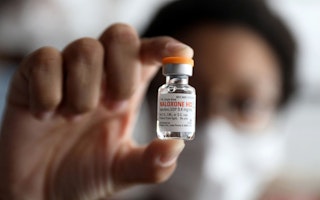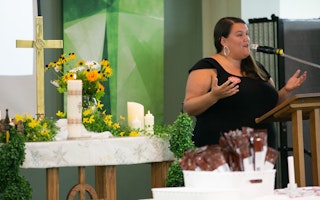Why Does Vancouver Need a Crack Pipe Vending Machine?
By Sarah Evans

A Canadian organization is turning heads after installing the first ever crack-pipe vending machines. As part of a larger harm reduction approach to safer crack use, the machines allow people who use crack to purchase a clean pipe for 25 cents, and help to reduce risk like HIV and hepatitis C. I sat down with Mark Townsend, director of the PHS Community Services Society, to discuss the vending machines, and the reasons behind them.
Why does Vancouver need crack pipe vending machines?
It’s part of a basic public health intervention, very similar to needle and syringe programs. People who smoke crack often get blisters or burns on their mouth, and sharing a pipe and mouthpiece means greater risk of HIV or hepatitis C, and possibly other infections like pneumonia. This vending machine makes clean pipes available those who need them.
But why vending machines?
Before we introduced the machines, a pipe cost anywhere between $1 and $10 on the street. This price was too high for many users, meaning people were more likely to share pipes or use unclean equipment. The machines increase the accessibility of affordable pipes at all hours of the day.
What do you say to critics who say that the machines promote drug use?
I would say that drug addiction is a tough issue in many countries. In Vancouver we are trying to find pragmatic ways of dealing with it. By helping to prevent new infections of HIV and hepatitis C, these machines save lives, but are also highly cost-effective. In Canada, an HIV infection costs taxpayers approximately $200,000 to $1.4 million, but at a mere 25 cents, a crack pipe saves us all money in the long run.
The vending machines are located in our Drug User Resource Center—a safe place for drug users to come in from the rain, have a meal, do their laundry, or participate in a creative arts or healing program. By providing people with clean needles and pipes, this center helps people who use drugs to stay safe, while also connecting them to other health services, including HIV and hepatitis C testing, counseling, and information about detox and drug treatment programs.
As with clean needle programs—that study after study have shown do not promote or increase drug use—the crack pipes are one way of reaching out to people and building trust so we can offer other services if and when they are ready.
Do you think this initiative will work?
Of course. We faced similar questions and debate with Insite, where research has proven that supervised injection not only reduces death and the spread of disease, but that people who use the facility are 30 percent more likely to go to detox and seek out drug treatment. We also offer those services right upstairs from Insite, at Onsite. So, crack pipe vending machines seem just like the kind of pragmatic approach we should embrace.
The machines themselves are not going to “solve” the complex problem of addiction, but they are one very effective piece of the puzzle. We are all familiar with the “tough love” messages for addicts, and we gave that argument up with heroin a long time ago. Now, needle and syringe programs are widely accepted as the best standard of care. But, we—advocates, the medical community, and governments—have not yet not fully embraced harm reduction for crack users. We need to.
Should other cities install crack pipe vending machines?
Communities need to come up with solutions that work for them. A vending machine is no substitute for human interaction. The vending machines work well in Vancouver because they are located within other programs. Whatever the local solutions are, they should include listening to what drug users say they need, and learning from what has worked elsewhere.
Many cities, including Vancouver, now have government-sponsored programs that distribute clean crack pipes. Yet as the debate about these vending machines demonstrates, the concept of harm reduction for stimulant drug use has just not taken hold the same way as its heroin counterpart.
Here are four cities that could use crack pipe distribution programs today to help reduce transmission of disease and to connect drug users with health services:
- New York: In 2010, nearly two decades after syringe distribution programs first became legal in New York, drug user activists finally won a specific carve-out from the criminal law to allow people to carry syringes without fear of arrest; however, no such carve-out exists for crack-related equipment. Users carrying clean pipes could still be charged for possession of drug paraphernalia, or even for drug possession related to any residue in their pipes. Despite the scale of crack and cocaine use in NYC, to date, even very basic services for crack users—such as access to clean pipes—remain limited.
- San Francisco: The City of San Francisco hands out 2.7 million clean needles a year to reduce HIV and hepatitis risk among injecting drug users. Earlier this year, the HIV Prevention and Planning Council made a formal recommendation to the city’s health department to start handing our crack pipes as part of a public health intervention. To date, this recommendation does not have the support of the Mayor, but some residents say they will do it on their own, citing the fact that needle exchange faced similar controversy when it got started.
- Bogota: “El Bronx” occupies a few square city blocks, cordoned off by barriers and police vehicles. Approximately 2,000 drug users live there, and smoke basuco, a cheap, unrefined version of crack. A few years ago, Mayor Gustavo Pedro, set up an outreach bus that would provide primary health care, psychological support, and treatment referrals to residents of el Bronx. They are now considering expanding this initiative to include specific harm reduction interventions for stimulant smokers.
- São Paulo: In January 2014, São Paulo Mayor Fernando Haddad launched “Operação Braços Abertos” (Operation Open Arms) to bring housing, healthcare, and income-generating activities to the troubled neighborhood known as “Cracolândia” (Crackland). Haddad’s initiative, which seeks to work with active users, is a bold new step for a city whose addiction policies have long been characterized by extreme repression. Yet more can be done to impact the transmission of HIV, hepatitis, and syphilis among the thousands of active smokers in Cracolândia. A local NGO distributes clean silicone mouthpieces. They work well, but with only two outreach workers, there is not enough clean equipment to go around.
PHS Community Services Society is a grantee of the Open Society Foundations.
Sarah Evans is a division director of Equity for the Open Society Foundations.

